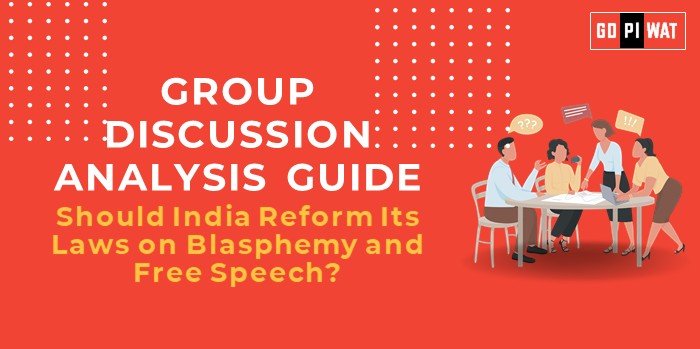📋 Group Discussion (GD) Analysis Guide: Should India Reform Its Laws on Blasphemy and Free Speech?
🌐 Introduction to the Topic
Opening Context: Blasphemy and free speech laws have long been contentious globally, reflecting a clash between religious sensitivities and the right to freedom of expression. In India, the debate has reignited with recent incidents involving artistic expression, media commentary, and public discourse.
Topic Background: India’s laws on blasphemy are rooted in Section 295A of the Indian Penal Code (IPC), a colonial-era provision intended to prevent religious strife. However, evolving democratic values and global trends in free speech highlight the need for nuanced reform.
📊 Quick Facts and Key Statistics
- 📜 Section 295A (IPC): Penalizes acts intended to insult religion with up to 3 years imprisonment or a fine.
- 🌍 Freedom of Press Index (2023): India ranks 161 out of 180 countries, signaling significant free speech challenges.
- ⚖️ Blasphemy Prosecutions: Over 80 reported cases annually in India, often involving marginalized communities.
- 🌏 Global Context: Countries like Denmark and Norway have abolished blasphemy laws, citing human rights considerations.
👥 Stakeholders and Their Roles
- Government: Ensures balance between maintaining public order and upholding constitutional rights.
- Judiciary: Interprets the laws, shaping the boundaries of free speech.
- Citizens and Activists: Demand reforms and act as watchdogs against misuse.
- Religious Leaders: Advocate for sensitivity and respect toward faiths.
- Media and Artists: Push boundaries of expression, often testing legal limits.
🏆 Achievements and Challenges
✔️ Achievements:
- Religious Harmony Tool: Section 295A has prevented major public unrest in sensitive times.
- Judicial Safeguards: Courts have set important precedents to curb misuse.
- Platform for Debate: The topic has raised awareness about the need for legal clarity.
⚠️ Challenges:
- Ambiguity in Enforcement: Vague definitions lead to arbitrary application.
- Suppression of Dissent: Laws are often weaponized to silence opposition.
- Global Criticism: India faces international pressure to align with human rights standards.
🌏 Global Comparisons
- 🇵🇰 Pakistan: Notoriously strict blasphemy laws often lead to vigilante justice.
- 🇺🇸 USA: Strong First Amendment protections make free speech paramount.
- 🇳🇴 Norway (2005): Abolition of blasphemy law upheld freedom of expression as a universal right.
📚 Case Studies
- 🇮🇳 India (2017): Arrest of a comedian for remarks perceived as blasphemous sparked debates on artistic freedom.
- 🇳🇴 Norway: Abolition of blasphemy laws highlighted alignment with human rights standards.
📖 Structured Arguments for Discussion
- Supporting Stance: “India’s blasphemy laws protect religious sentiments and prevent communal unrest.”
- Opposing Stance: “These laws are outdated and often misused, curbing essential freedoms in a democracy.”
- Balanced Perspective: “A reformed law balancing religious respect with freedom of expression is the way forward.”
📜 Effective Discussion Approaches
- Opening Approaches:
- Start with statistics, e.g., India’s rank on the Freedom of Press Index.
- Introduce a relevant case study like the Norwegian abolition of blasphemy laws.
- Counter-Argument Handling:
- Acknowledge the law’s preventive role but propose safeguards against misuse.
📊 Strategic Analysis of Strengths and Weaknesses
- Strengths: Maintains public order, respects pluralism.
- Weaknesses: Prone to misuse, lacks clarity.
- Opportunities: Modernization of laws could enhance democratic values.
- Threats: Risk of backlash from religious groups.
🏫 Connecting with B-School Applications
- Real-World Applications: Explore intersections of law, ethics, and business in governance studies.
- Sample Interview Questions:
- “How would you balance free speech with religious sensitivity in a business setting?”
- “What role do laws play in shaping a country’s global image?”
- Insights for B-School Students: Legal reforms can be linked to corporate responsibility and ethical governance.


